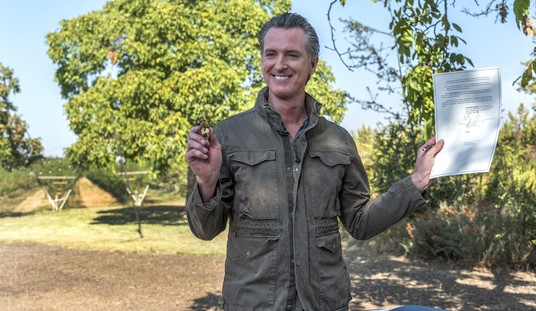Call it the John Kerry two-step, with an extra 180-degree turn. Recalling the infamous “I was for the $87 billion before I was against it” flip-flop, the Boston Globe’s Scot Lehigh calls out Martha Coakley for not one but two flip-flops on the death penalty:
LAST OCTOBER, I sat down with Martha Coakley to talk about the issues. … When the topic turned to the death penalty, Coakley, who had once favored capital punishment for cop killers and murderers who slay again while in prison, said she was now against it in any circumstance. She contrasted her stand with that of [primary opponent Michael] Capuano, who in 2001 had voted for federal anti-terrorism legislation that included capital punishment for terrorists who bomb public areas or government buildings.
“So if you are Mike Capuano, don’t say you are against the death penalty. You have carved out an exception,’’ she said. “He has now voted in favor of the death penalty for terrorism. It is also an example of, if you are principled, you are against the death penalty.’’
Well, that’s a big if, as Lehigh discovered during the debate on Monday evening. Coakley got asked whether she would support a death-penalty sentence for Osama bin Laden or Khalid Sheikh Mohammed, and suddenly Coakley began parsing:
“He will get the death penalty if he is found guilty,’’ she said. Brown then asked whether she agreed that he should get the death penalty. “Yes, because that is what the federal law says right now,’’ Coakley replied.
When Brown noted that she had come out strongly against the death penalty, Coakley said she didn’t support it personally and wouldn’t vote for it. Still, she said, US Attorney General Eric Holder had decided to try Khalid Shaikh Mohammed in federal court and “it’s their decision to make.’’ If found guilty, “he will face the death penalty,’’ she concluded. “That’s what the law of the land is and I would support the law of the land, even though I disagree with it personally.’’
So: When trying to fend off a liberal primary rival, Coakley said she was against the death penalty for Khalid Shaikh Mohammed and criticized Capuano for supporting legislation that included capital punishment for terrorists. But now, running a general election race against the more conservative Brown, she’s finessing what she once cited as a principled position.
Like Lehigh, I generally oppose the death penalty for criminal trials. However, I make a big distinction between people tried for criminal acts and foreign terrorists committing acts of war. The latter don’t belong in criminal courts for a number of reasons, and if found determined to have conducted such attacks as unlawful combatants, should suffer the penalty of that class under the rules of war — execution. In fact, there shouldn’t be any other option. They chose to be terrorists, attack civilians for their political/ideological/theocratic motivations, and the US should stick to the well-established practices of war in dealing with them.
Actually, Coakley could easily have answered the question in that manner, which would have gotten her off the hook on the death-penalty issue, at least somewhat. But she couldn’t do that without criticizing Barack Obama and Eric Holder, who have decided to use the criminal courts instead — for the first time ever with terrorists captured abroad by military or intelligence personnel. Instead, she did a double Kerry, only while attempting (as Kerry also did) to parse her words so carefully that everyone understood her to be less than honest about them.
Meanwhile, EJ Dionne thinks that the national GOP involvement will be an albatross for Scott Brown:
Here’s the paradox of the Massachusetts Senate race that everyone is now watching: Republican Scott Brown was doing an excellent job without the national attention. The fact that the race has been nationalized may be the best thing that happened to Democrat Martha Coakley — even if all the news has suggested that she is weaker than expected.
Brown was running well as an insurgent who was somewhat disconnected from the national Republican Party. Conservatives, Republicans and tea-party types were already mobilized to vote next Tuesday. Democrats were asleep. All the national attention to the race now gives Democrats a reason to vote. Brown does better as an independent-minded outsider than as someone who is now recast as part of Washington’s partisan battles. He is trying gamely to preserve his independent image, but that has become harder, and the Democrats’ advertising is aimed at tying him into the Washington Republican Establishment.
I’d say that the risk was there for that kind of reaction. But has it actually arisen? The polls tell a different story, at least thus far. In fact, it’s worth noting that Brown’s sudden gains in polling — and Coakley’s abrupt decline — came after the national effort to support Brown, not before it. That’s not to say that there won’t be a backlash as we get closer to the election, but it certainly hasn’t materialized yet.
Democrats in Massachusetts appear demoralized, independents are fleeing, and it’s the GOP that has the energy at the moment. The fact that the DSCC, the state Democratic Party, and the unions have to dump an aggregate of over a million dollars into the campaign in the final week — money they won’t easily recoup — speaks to the notion that Democrats “have a reason to vote.”
The DSCC is buying ads in Boston, a town the Democrats own. Would they be spending that money if they already thought Democrats have been given a reason to vote?








Join the conversation as a VIP Member